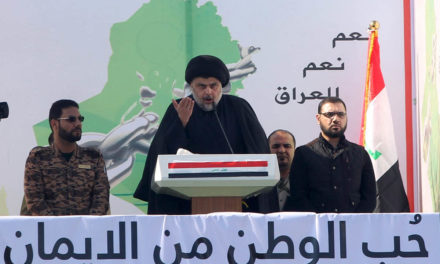The question of good leadership is not only the concern of scholars and experts but of every voter who will have to make a decision based on this complicated question at the ballot box. Therefore, which politicians to choose to lead the country in the forthcoming years poses more or less a dilemma for people in democracies, especially nascent democracies like Iraq that face an abundance of challenges and difficulties.
In stable democracies, things like past performance, bios, and campaign platforms of candidates are important tools that help voters decide who is most deserving of their vote. However, in Iraq many aspects of the elections are not the same as elsewhere given Iraq’s special circumstance. Hence, these tools do not necessarily play the same role.
For instance, Iraqi politics is still not issue-based, even if this is gradually changing. Populist rhetoric remains the main approach to mobilize the masses in Iraq. This is why the value of bios to Iraqi voters would be more about identifying the identity of a leader and less about their performance. Based on that, a candidate with a well-known family name and legacy tends to make more strides during their political career than one with actual life experience suitable for leadership.
Furthermore, if Iraqi politics were issue-based, comparing election platforms and following up on campaign pledges would be the main approach for voters to evaluate their options. However, current election platforms in Iraq are written based on ‘what sounds right’, not ‘what is right’ containing often many clichés. It can also be noticed that most election platforms are not specific and detailed. Iraqi voters are still concerned about the major challenges that are facing the country like security and borders, job opportunities, and combating corruption, and not issues like reducing a specific tax or the stance of a specific candidate about a given law, just like it would be the case in stable democracies. Hence, election platforms tend to be too broad for voters to compare between them.
The issue of performance is also problematic in Iraq. Given that Iraq’s political process is based on a quota system where all ethnic and religious groups are represented by tradition, there are no outright majority winners in the elections who form the government and losers who represent the opposition as is the case in stable democracies around the world. Rather, the cabinet formation process has been historically complicated and is based on a hard-won agreement amongst the different political and ethnic groups that drastically limits the choices to form the cabinet for the prime minister. As a result, it is not possible to judge performance easily given that all successes and failures are shared and cannot be attributed to a certain politician or party.
This is why it is challenging for Iraqis to make informed choices in this regard. Nevertheless, this issue remains incredibly important, especially that the next elections are going to be critical for the future of the country, as many analysts point out. While there are no foolproof criteria for what makes a good leader in the case of Iraq, I believe that it is still useful to point out three characteristics that are important indicators of competent leadership.
The first is serving people. While this might seem obvious, Iraqi leaders who really try to serve their constituents are rare. This is especially true when it comes to crafting policies and introducing projects that aim to benefit people without necessarily achieving quick wins.
For instance, a very unfortunate election practice in Iraq was promising to distribute land and organizing giveaways through patronage networks in order to get votes. This is not really serving the interests of the constituents even if those on the receiving end would like that.
Real Leadership is not a popularity contest. What distinguished good leadership from popular leadership is that good leaders do what it takes even if their actions do not enthrall the masses. For instance, it is well-known that the public sector in Iraq is over-bloated. This is due to an uncontrolled hiring policy after 2003 that made the government the largest employer in the country. Although this policy has been popular with the people, it made the public sector ineffective and inefficient, and the economy vulnerable.
The responsible approach however is implementing economic policies that make doing business easier, and preparing the environment to attract foreign investment. Progress in these areas is slow and not easily noticed by the constituents, but it eventually serves them best.
This brings us to the next important characteristics of competent leadership. Leaders who are not concerned about the future are not really doing their job. According to many experts, the real arena of a leader is actually the future, not the present. Responsible leaders think about the long-term interests and concerns of their citizens by introducing projects that make the life of the people in the long run better and by implementing policies that help prevent future crises. For instance, Iraq’s water crisis is well-known to many experts and has was predicted many years ago. Nevertheless, not much has been done although Iraq has had for a long time several options on how to deal with the issue. If Iraq had more future-oriented decision makers, the crisis would not have reached this acute level.
A third issue that is very important for a leader is to be engaged in transformation. Many politicians do not tackle important issues requiring change although they know it is necessary because it means performing very hard work that has high risks of failure. Reforming the public sector and tackling corruption, for instance, will certainly create political enemies given that it disrupts the interests of many stakeholders involved. Even smaller changes like restructuring a ministry will cause resistance to change, layoffs, and stricter hiring criteria that might not be popular with the voters. Nevertheless, on the long-term reforms are necessary and will have important positive effects on the life the people. Good leadership requires going through them no matter, what even if the initial efforts fail.
Obviously, these criteria might not be completely sufficient to identify competent leaders. However, they certainly help in making a more informed decision.

Muhammad Al-Waeli
Muhammad Al-Waeli is an Iraqi commentator on political and social issues. He is currently doing a PhD in Human Resource Management and is interested in politics, media, and development.










